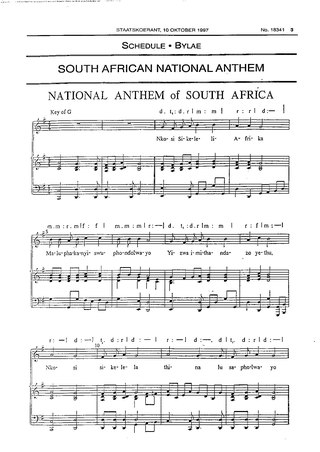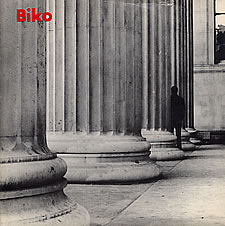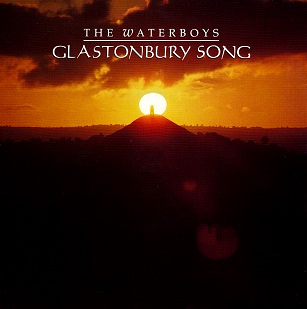
The national anthem of South Africa was adopted in 1997 and is a hybrid song combining extracts of the 19th century Xhosa hymn "Nkosi Sikelel' iAfrika" and the Afrikaans song that was used as the South African national anthem during the apartheid era, "Die Stem van Suid-Afrika", with new English lyrics.

Spitting Image is a British satirical television puppet show, created by Peter Fluck, Roger Law and Martin Lambie-Nairn. First broadcast in 1984, the series was produced by 'Spitting Image Productions' for Central Independent Television over 18 series which aired on the ITV network. The series was nominated and won numerous awards, including ten BAFTA Television Awards, and two Emmy Awards in 1985 and 1986 in the Popular Arts Category. The series features puppet caricatures of contemporary celebrities and public figures, including British Prime Ministers Margaret Thatcher and John Major and the British royal family. The series was the first to caricature Queen Elizabeth The Queen Mother.

Breyten Breytenbach is a South African writer, poet, and painter who became internationally well-known as a dissident poet and vocal critic of South Africa under apartheid, and as a political prisoner of the National Party-led South African Government. Breytenbach is now informally considered by Afrikaans-speakers as their poet laureate and is one of the most important living poets in Afrikaans literature. He also holds French citizenship.

"Nkosi Sikelel' iAfrika" is a Christian hymn originally composed in 1897 by Enoch Sontonga, a Xhosa clergyman at a Methodist mission school near Johannesburg.

Zenzile Miriam Makeba, nicknamed Mama Africa, was a South African singer, songwriter, actress, and civil rights activist. Associated with musical genres including Afropop, jazz, and world music, she was an advocate against apartheid and white-minority government in South Africa.

"Turkey in the Straw" is an American folk song that first gained popularity in the 19th century. Early versions of the song were titled "Zip Coon", which were first published around 1834 and performed in minstrel shows, with different people claiming authorship of the song. The melody of "Zip Coon" later became known as "Turkey in the Straw"; a song titled "Turkey in de Straw" with different music and lyrics was published in 1861 together with the wordless music of "Zip Coon" added at the end, and the title "Turkey in the Straw" then became linked to the tune of "Zip Coon".

"Seven Drunken Nights" is a humorous Irish folk song most famously performed by The Dubliners. It is a variation of the English/Scottish folk song "Our Goodman". It tells the story of a gullible drunkard returning night after night to see new evidence of his wife's lover, only to be taken in by increasingly implausible explanations.
"The Army Goes Rolling Along" is the official song of the United States Army and is typically called "The Army Song". It is adapted from an earlier work titled the "U.S. Field Artillery March".

"Biko" is an anti-apartheid protest song by English rock musician Peter Gabriel. It was released by Charisma Records as a single from Gabriel's eponymous third album in 1980.

"Glastonbury Song" is a song by British band the Waterboys, released in July 1993 by Geffen Records as the second single from their sixth studio album, Dream Harder (1993). It was written by Mike Scott and produced by Scott and Bill Price. The song reached number 29 on the UK Singles Chart and number 12 on the Irish Singles Chart. The accompanying music video was directed by John Downer.

"The Chicken Song" is a novelty song by the British satirical comedy television programme Spitting Image. The nonsensical lyrics were written by Rob Grant and Doug Naylor; the music was written by Philip Pope, who also produced the song, with Michael Fenton Stevens as vocalist.
"Shortnin' Bread" is an American folk song dating back at least to 1900, when James Whitcomb Riley published it as a poem. While there is speculation that Riley may have based his poem on an earlier African-American plantation song, no definitive evidence of such an origin has yet been uncovered. A "collected" version of the song was published by E. C. Perrow in 1915. It is song number 4209 in the Roud Folk Song Index.
"Botany Bay" is a song that can be traced back to the musical burlesque, Little Jack Sheppard, staged at the Gaiety Theatre, London, England, in 1885 and in Melbourne, Australia, in 1886. The show was written by Henry Pottinger Stephens and William Yardley, with music composed and arranged by Wilhelm Meyer Lutz. The show's programme credits "Botany Bay" as "Old Air arr. Lutz". Sheet music from Allan & Co. in Australia credits Florian Pascal, the pseudonym of Joseph Williams Jr. (1847–1923), a music publisher and composer who published the show's music. Pascal composed other numbers in the score but received no credit for "Botany Bay" in the programme.

"Nobody Knows the Trouble I've Seen" is an African-American spiritual song that originated during the period of slavery but was not published until 1867. The song is well known and many cover versions of it have been done by artists such as Marian Anderson, Lena Horne, Louis Armstrong, Harry James, Paul Robeson, and Sam Cooke among others. Anderson had her first successful recording with a version of this song on the Victor label in 1925. Horne recorded a version of the song in 1946. The Deep River Boys recorded their version in Oslo on August 29, 1958. It was released on the extended play Negro Spirituals Vol. 1, and the song was arranged by Harry Douglas.
Peter Brewis is a composer and instrumentalist who has been active in several spheres of music from ballet and modern dance to music theatre and rock music. Although he was classically trained, studying under the famous French music educator Nadia Boulanger, he has also written for comedy shows such as Spitting Image, for which he composed "I've Never Met a Nice South African."
"Scatterlings of Africa" is a 1982 song by the South African band Juluka, first released on their 1982 album Scatterlings. It was re-released in 1987 by Juluka's successor band Savuka on Third World Child. The song was a commercial success, charting in France and the United Kingdom. Its lyrics explore the "myriad dislocations" experienced by South Africa. The rousing and upbeat music incorporated Zulu influences. The song introduced the music of Johnny Clegg, the cofounder of Juluka and Savuka, to Western audiences.
"Bring Him Back Home (Nelson Mandela)", also known as "Bring Him Back Home", is an anthemic anti-apartheid protest song written by South African musician Hugh Masekela. It was released as the first track of his 1987 album Tomorrow. It was recorded in 1986 when Masekela was in exile from the apartheid regime of South Africa. The melody of the song is buoyant, containing a number of powerful chords and trumpet riffs. The lyrics of the song demand the release of Black South African leader Nelson Mandela, who had been imprisoned by the White South African government on Robben Island since 1962. The song became enormously popular, and turned into an unofficial anthem of the anti-apartheid movement. It became one of Masekela's most performed live songs. It was later used as a part of the official soundtrack to the documentary film Amandla!: A Revolution in Four-Part Harmony. The song was included in the 1994 live album Hope and in the 2001 collection Grazing in the Grass: The Best of Hugh Masekela, released by Columbia Records.

The apartheid regime in South Africa began in 1948 and lasted until 1994. It involved a system of institutionalized racial segregation and white supremacy, and placed all political power in the hands of a white minority. Opposition to apartheid manifested in a variety of ways, including boycotts, non-violent protests, and armed resistance. Music played a large role in the movement against apartheid within South Africa, as well as in international opposition to apartheid. The impacts of songs opposing apartheid included raising awareness, generating support for the movement against apartheid, building unity within this movement, and "presenting an alternative vision of culture in a future democratic South Africa."

"Asimbonanga", also known as "Asimbonanga (Mandela)", is an anti-apartheid song by the South African racially integrated band Savuka. It was first released as a 12" single in 1986, and then included in their 1987 album Third World Child. It alluded to Nelson Mandela, imprisoned on Robben Island at the time of song's release, and other anti-apartheid activists. "Asimbonanga" is a Zulu phrase that may be translated as "We have not seen him". It was well received, becoming popular within the movement against apartheid, and was covered by several artists including Joan Baez and the Soweto Gospel Choir.

Another Country is the third album by South African Afropop fusion band Mango Groove. It was released in 1993, near the end of the negotiations to end apartheid in South Africa. The album was released in South Africa on cassette and CD by One World Entertainment, an imprint of Tusk Music.












